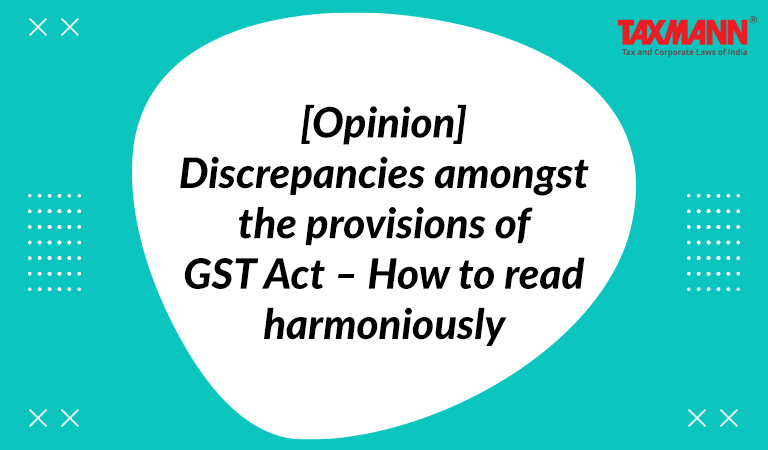[Opinion] Discrepancies amongst the provisions of GST Act – How to read harmoniously
- Blog|News|GST & Customs|
- 3 Min Read
- By Taxmann
- |
- Last Updated on 20 January, 2023

Though GST Act 2017 was introduced in the midnight of 1st July 2017 still there are several discrepancies that are being visualized day in and day out.
Reading the religious books like Bhagawat Gita, Bible and Quran, Guru Govind Sahiba Grandh etc., would relieve us from the problems or the daily imitations and provide us a feel of mental peace and would show different experience each and every time , but reading the GST Act would complicate all the stakeholders and the courts who are all regularly completely engrossed in implementing the GST Law. Needless it is to submit that as the daily life experiences to find out a kind of certainty about the position of law as it is overwhelmingly with innumerable circulars, notifications and amendments to the provisions and also the rules that.
One good thing is that the Act is a centralized one and to say that many of the States have adopted the Central Act though Article 246A of the Constitution empowers the States to enact separate laws for each of the States.
Be that as it may, the discrepancy that is to be noted is with regard to section 73 & 74. Section 73 which provides for determination of tax not paid or short paid or erroneously refunded or input tax credit wrongly availed or utilised for any reason other than fraud or any wilful-misstatement or suppression of facts. This provision enumerates that under sub section (1) if any tax has not been paid etc., short paid or erroneously refunded or where input tax credit has been wrongly availed not by way of fraud or willful misstatement, a notice may be issued as to why he should not pay the tax, interest under section 50 and penalty as specified under this Act.
Subsection (5) says before service of notice, the person chageable with tax may pay the tax along with interest under section 50 on the basis of his own ascertainment or ascertainment by the proper officer and inform the proper office in writing about the payment of tax. Under subsection (6), the proper office should not serve any notice under section 1 or as the case may be, the statement under subsection (3) in respect of tax or penalty payable under the provisions of this Act.
The whole discrepancy that I have noticed is in subsection (8) which says that “where any person chargeable with tax under subsection (1) or subsection (3) pays the said tax along with interest payable under section 50 within 30 days of issue of show cause notice , no penalty shall be payable and all proceedings in respect of the said notice shall be deemed to be concluded.
Here subsection (8) is contrary to subsection (6) as when any person pays the tax and interest, no penalty should be payable as stated in subsection (8) and subsection (6) is somewhat different as it says that if tax is paid then the authority is not to serve any notice in respect of the tax so paid or any penalty payable under the provisions of the Act or rules.
When Form DRC -01A is said to be not a show cause notice, if any dealer pays the tax and interest, then no penalty shall be payable but we see Form DRC -01A is issued including penalty. If subsection (1) of Section 73 is read, then there is a discrepancy in between these two subsections and also subsection (5) and (6).
So also section 74 which says that
“determination of tax not paid or short paid or erroneously refunded or input tax credit wrongly availed or utilized by reason of fraud or any willful misstatement or suppression of fact”.
Click Here To Read The Full Article
Disclaimer: The content/information published on the website is only for general information of the user and shall not be construed as legal advice. While the Taxmann has exercised reasonable efforts to ensure the veracity of information/content published, Taxmann shall be under no liability in any manner whatsoever for incorrect information, if any.

Taxmann Publications has a dedicated in-house Research & Editorial Team. This team consists of a team of Chartered Accountants, Company Secretaries, and Lawyers. This team works under the guidance and supervision of editor-in-chief Mr Rakesh Bhargava.
The Research and Editorial Team is responsible for developing reliable and accurate content for the readers. The team follows the six-sigma approach to achieve the benchmark of zero error in its publications and research platforms. The team ensures that the following publication guidelines are thoroughly followed while developing the content:
- The statutory material is obtained only from the authorized and reliable sources
- All the latest developments in the judicial and legislative fields are covered
- Prepare the analytical write-ups on current, controversial, and important issues to help the readers to understand the concept and its implications
- Every content published by Taxmann is complete, accurate and lucid
- All evidence-based statements are supported with proper reference to Section, Circular No., Notification No. or citations
- The golden rules of grammar, style and consistency are thoroughly followed
- Font and size that’s easy to read and remain consistent across all imprint and digital publications are applied



 CA | CS | CMA
CA | CS | CMA
